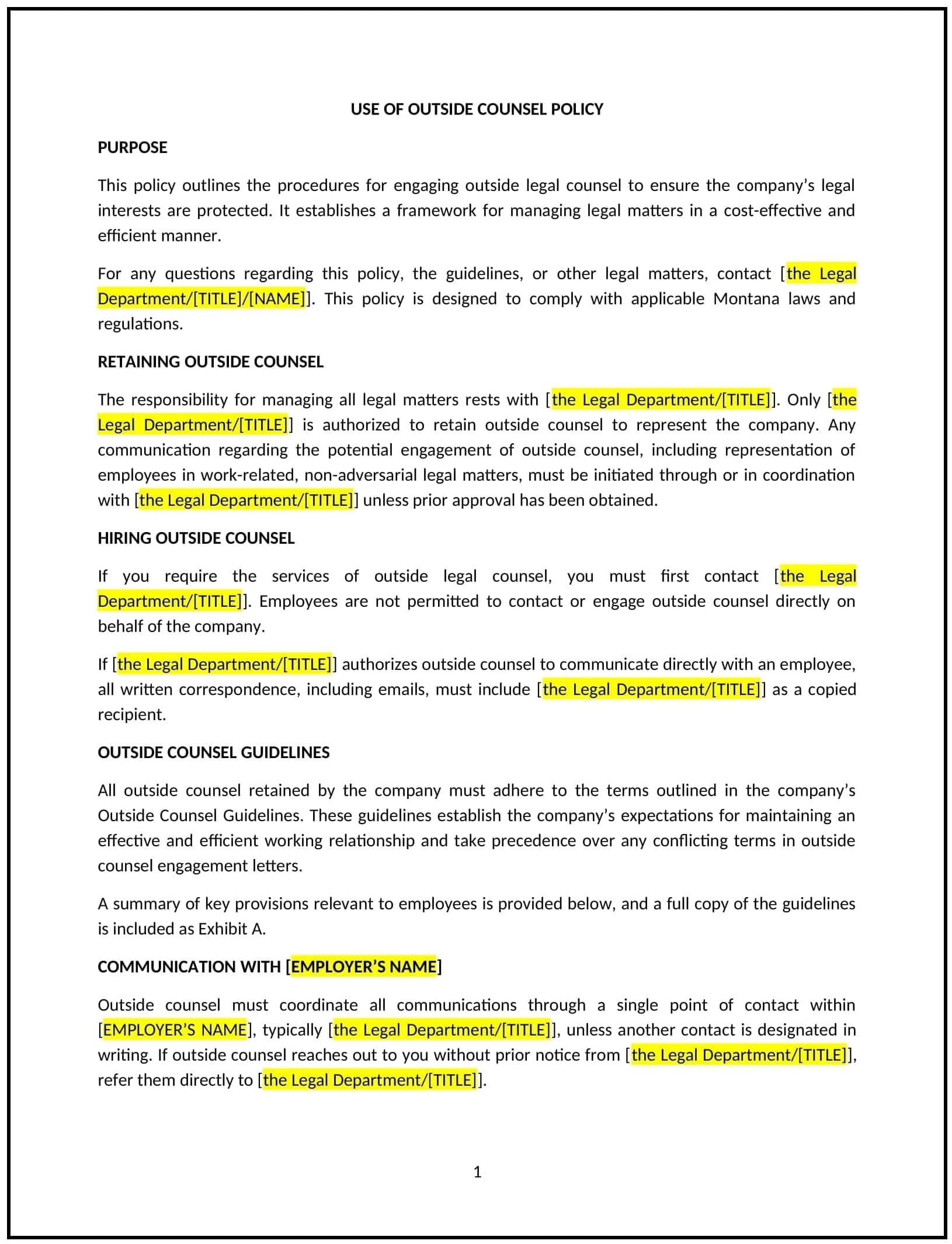Use of outside counsel policy (Montana): Free template
Got contracts to review? While you're here for policies, let Cobrief make contract review effortless—start your free review now.

Customize this template for free
Use of outside counsel policy (Montana)
A use of outside counsel policy helps Montana businesses define when and how outside legal counsel will be engaged for legal matters that require expertise beyond the company’s internal legal team. This policy outlines the process for selecting, retaining, and managing outside counsel, as well as the expectations regarding billing practices, confidentiality, and the scope of work.
By implementing this policy, businesses can ensure that they are utilizing external legal resources efficiently and cost-effectively while maintaining legal protections and fostering positive relationships with outside counsel.
How to use this use of outside counsel policy (Montana)
- Define when to engage outside counsel: The policy should specify the circumstances under which outside counsel should be engaged, such as for specialized legal matters, litigation, regulatory compliance, or when the company’s internal legal team has capacity constraints.
- Set selection criteria: The policy should outline how outside counsel will be selected, including factors such as expertise, experience, reputation, cost-effectiveness, and alignment with the company’s legal and ethical standards.
- Establish approval processes: The policy should define the process for obtaining internal approval to engage outside counsel, including which departments or executives need to sign off on the decision and any necessary documentation.
- Address billing practices and rates: The policy should provide guidelines for negotiating and approving the billing rates and payment terms for outside counsel. It should include how to ensure the costs are reasonable and how invoices should be reviewed and approved.
- Define scope of work: The policy should clearly outline the scope of work for outside counsel, including the specific legal services to be provided, deadlines, and the expected outcomes of their engagement.
- Ensure confidentiality and data protection: The policy should emphasize the importance of confidentiality, ensuring that outside counsel maintains the privacy of sensitive company information and adheres to data protection regulations.
- Review and update regularly: The policy should be reviewed periodically to ensure it remains aligned with the company’s needs, evolving legal requirements, and any changes in the availability or cost of outside counsel services.
Benefits of using this use of outside counsel policy (Montana)
This policy provides several key benefits for Montana businesses:
- Manages legal costs effectively: By clearly defining when and how outside counsel should be used, businesses can avoid unnecessary legal expenses and ensure that external legal resources are used in a cost-effective manner.
- Reduces risks: Establishing clear guidelines for selecting and managing outside counsel helps reduce the risk of engaging attorneys who may not be the best fit for the business’s needs or who may not adhere to ethical or confidentiality standards.
- Enhances legal expertise: Outside counsel can provide specialized knowledge and experience, ensuring that the company has access to high-quality legal advice for complex issues.
- Improves efficiency: A structured process for engaging outside counsel streamlines decision-making and ensures that legal matters are handled promptly, without unnecessary delays or confusion.
- Ensures consistency in legal matters: By defining the scope and expectations for outside counsel, businesses can ensure that legal work is done consistently and aligns with the company’s broader legal strategy.
- Strengthens relationships with legal providers: Clear communication of expectations and billing practices fosters strong, collaborative relationships with outside counsel, contributing to a more effective partnership.
Tips for using this use of outside counsel policy (Montana)
- Communicate the policy clearly: Ensure that all employees involved in legal matters understand the process for engaging outside counsel, including the selection criteria, approval procedures, and billing practices.
- Monitor legal costs: Regularly review invoices from outside counsel to ensure that they align with the agreed-upon terms, that the work is necessary, and that the costs are reasonable.
- Maintain a strong relationship with outside counsel: Foster open communication with outside counsel to ensure alignment on legal strategies, expectations, and progress on legal matters.
- Use outside counsel selectively: Avoid engaging outside counsel for routine legal tasks that can be handled internally. Reserve the use of outside counsel for specialized legal matters or complex issues that require expertise beyond the company’s internal resources.
- Document all engagements: Ensure that all engagements with outside counsel are well-documented, including the scope of work, billing arrangements, and any other terms or conditions that may apply.
- Review and update the policy periodically: Periodically review the policy to ensure it remains relevant to the company’s legal needs and that it continues to reflect best practices for managing relationships with outside counsel.